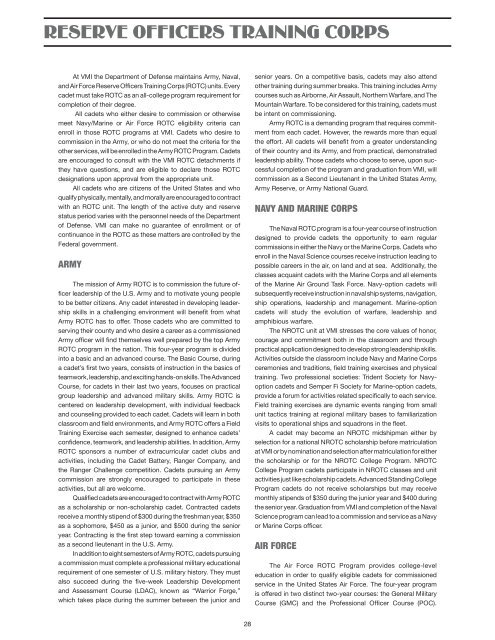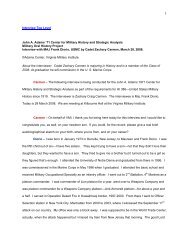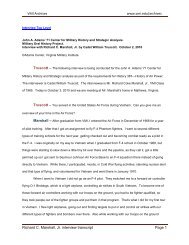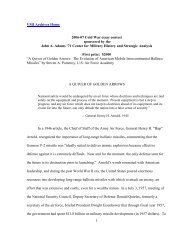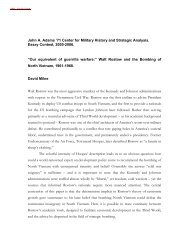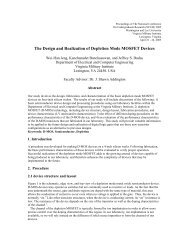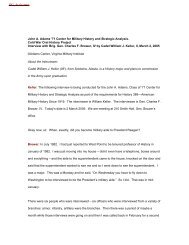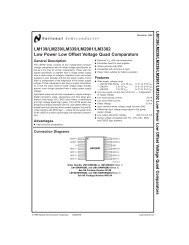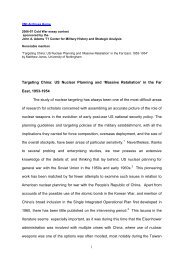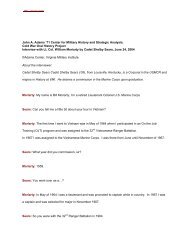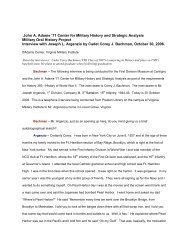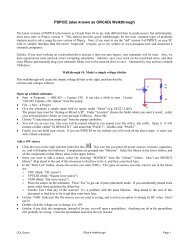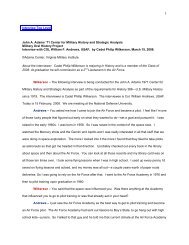Academic Catalog - Virginia Military Institute Admissions
Academic Catalog - Virginia Military Institute Admissions
Academic Catalog - Virginia Military Institute Admissions
You also want an ePaper? Increase the reach of your titles
YUMPU automatically turns print PDFs into web optimized ePapers that Google loves.
Reserve Officers Training Corps<br />
At VMI the Department of Defense maintains Army, Naval,<br />
and Air Force Reserve Officers Training Corps (ROTC) units. Every<br />
cadet must take ROTC as an all-college program requirement for<br />
completion of their degree.<br />
All cadets who either desire to commission or otherwise<br />
meet Navy/Marine or Air Force ROTC eligibility criteria can<br />
enroll in those ROTC programs at VMI. Cadets who desire to<br />
commission in the Army, or who do not meet the criteria for the<br />
other services, will be enrolled in the Army ROTC Program. Cadets<br />
are encouraged to consult with the VMI ROTC detachments if<br />
they have questions, and are eligible to declare those ROTC<br />
designations upon approval from the appropriate unit.<br />
All cadets who are citizens of the United States and who<br />
qualify physically, mentally, and morally are encouraged to contract<br />
with an ROTC unit. The length of the active duty and reserve<br />
status period varies with the personnel needs of the Department<br />
of Defense. VMI can make no guarantee of enrollment or of<br />
continuance in the ROTC as these matters are controlled by the<br />
Federal government.<br />
Army<br />
The mission of Army ROTC is to commission the future officer<br />
leadership of the U.S. Army and to motivate young people<br />
to be better citizens. Any cadet interested in developing leadership<br />
skills in a challenging environment will benefit from what<br />
Army ROTC has to offer. Those cadets who are committed to<br />
serving their county and who desire a career as a commissioned<br />
Army officer will find themselves well prepared by the top Army<br />
ROTC program in the nation. This four-year program is divided<br />
into a basic and an advanced course. The Basic Course, during<br />
a cadet’s first two years, consists of instruction in the basics of<br />
teamwork, leadership, and exciting hands-on skills. The Advanced<br />
Course, for cadets in their last two years, focuses on practical<br />
group leadership and advanced military skills. Army ROTC is<br />
centered on leadership development, with individual feedback<br />
and counseling provided to each cadet. Cadets will learn in both<br />
classroom and field environments, and Army ROTC offers a Field<br />
Training Exercise each semester, designed to enhance cadets’<br />
confidence, teamwork, and leadership abilities. In addition, Army<br />
ROTC sponsors a number of extracurricular cadet clubs and<br />
activities, including the Cadet Battery, Ranger Company, and<br />
the Ranger Challenge competition. Cadets pursuing an Army<br />
commission are strongly encouraged to participate in these<br />
activities, but all are welcome.<br />
Qualified cadets are encouraged to contract with Army ROTC<br />
as a scholarship or non-scholarship cadet. Contracted cadets<br />
receive a monthly stipend of $300 during the freshman year, $350<br />
as a sophomore, $450 as a junior, and $500 during the senior<br />
year. Contracting is the first step toward earning a commission<br />
as a second lieutenant in the U.S. Army.<br />
In addition to eight semesters of Army ROTC, cadets pursuing<br />
a commission must complete a professional military educational<br />
requirement of one semester of U.S. military history. They must<br />
also succeed during the five-week Leadership Development<br />
and Assessment Course (LDAC), known as “Warrior Forge,”<br />
which takes place during the summer between the junior and<br />
senior years. On a competitive basis, cadets may also attend<br />
other training during summer breaks. This training includes Army<br />
courses such as Airborne, Air Assault, Northern Warfare, and The<br />
Mountain Warfare. To be considered for this training, cadets must<br />
be intent on commissioning.<br />
Army ROTC is a demanding program that requires commitment<br />
from each cadet. However, the rewards more than equal<br />
the effort. All cadets will benefit from a greater understanding<br />
of their country and its Army, and from practical, demonstrated<br />
leadership ability. Those cadets who choose to serve, upon successful<br />
completion of the program and graduation from VMI, will<br />
commission as a Second Lieutenant in the United States Army,<br />
Army Reserve, or Army National Guard.<br />
Navy and Marine Corps<br />
The Naval ROTC program is a four-year course of instruction<br />
designed to provide cadets the opportunity to earn regular<br />
commissions in either the Navy or the Marine Corps. Cadets who<br />
enroll in the Naval Science courses receive instruction leading to<br />
possible careers in the air, on land and at sea. Additionally, the<br />
classes acquaint cadets with the Marine Corps and all elements<br />
of the Marine Air Ground Task Force. Navy-option cadets will<br />
subsequently receive instruction in naval ship systems, navigation,<br />
ship operations, leadership and management. Marine-option<br />
cadets will study the evolution of warfare, leadership and<br />
amphibious warfare.<br />
The NROTC unit at VMI stresses the core values of honor,<br />
courage and commitment both in the classroom and through<br />
practical application designed to develop strong leadership skills.<br />
Activities outside the classroom include Navy and Marine Corps<br />
ceremonies and traditions, field training exercises and physical<br />
training. Two professional societies: Trident Society for Navyoption<br />
cadets and Semper Fi Society for Marine-option cadets,<br />
provide a forum for activities related specifically to each service.<br />
Field training exercises are dynamic events ranging from small<br />
unit tactics training at regional military bases to familiarization<br />
visits to operational ships and squadrons in the fleet.<br />
A cadet may become an NROTC midshipman either by<br />
selection for a national NROTC scholarship before matriculation<br />
at VMI or by nomination and selection after matriculation for either<br />
the scholarship or for the NROTC College Program. NROTC<br />
College Program cadets participate in NROTC classes and unit<br />
activities just like scholarship cadets. Advanced Standing College<br />
Program cadets do not receive scholarships but may receive<br />
monthly stipends of $350 during the junior year and $400 during<br />
the senior year. Graduation from VMI and completion of the Naval<br />
Science program can lead to a commission and service as a Navy<br />
or Marine Corps officer.<br />
Air Force<br />
The Air Force ROTC Program provides college-level<br />
education in order to qualify eligible cadets for commissioned<br />
service in the United States Air Force. The four-year program<br />
is offered in two distinct two-year courses: the General <strong>Military</strong><br />
Course (GMC) and the Professional Officer Course (POC).<br />
28


